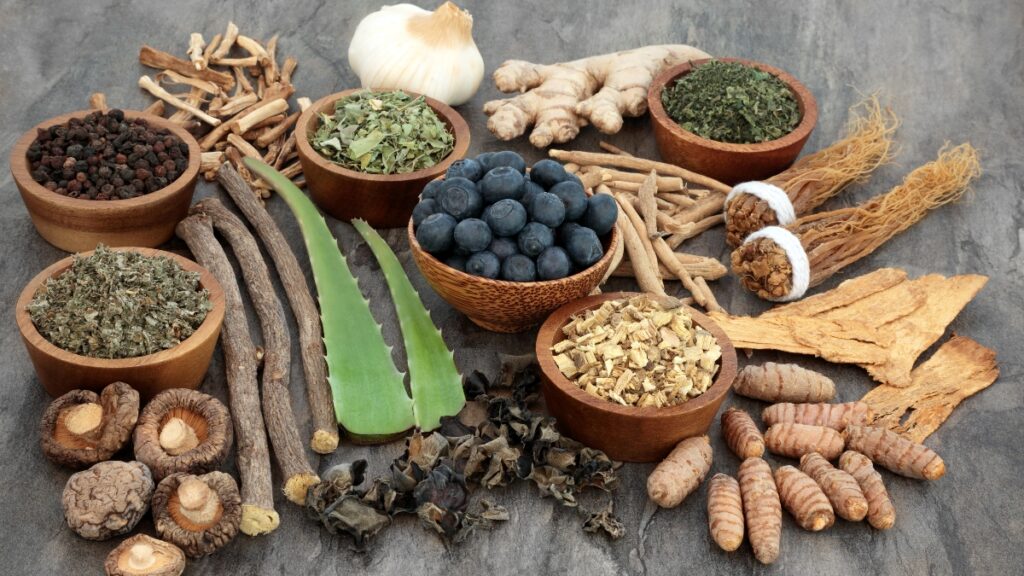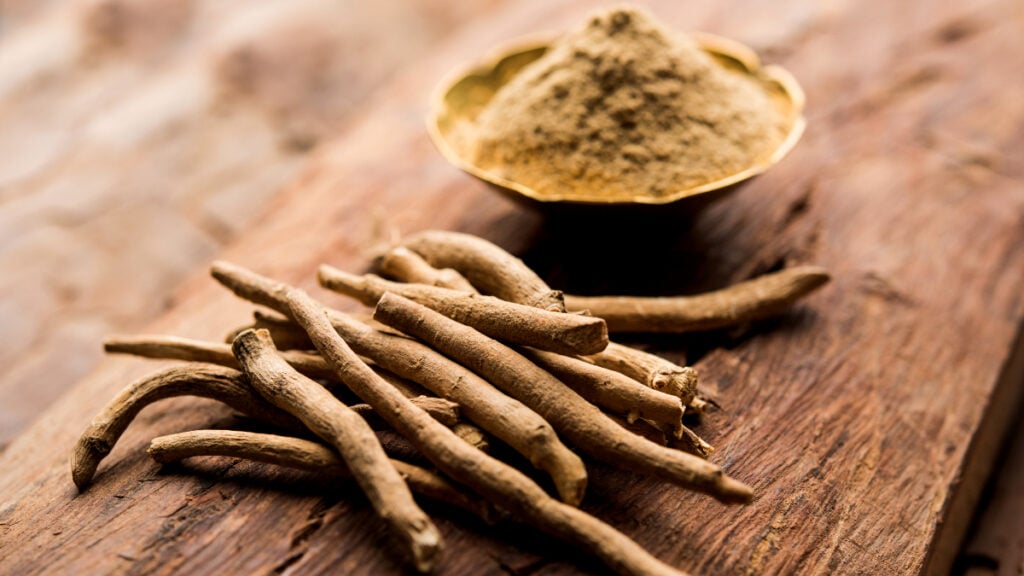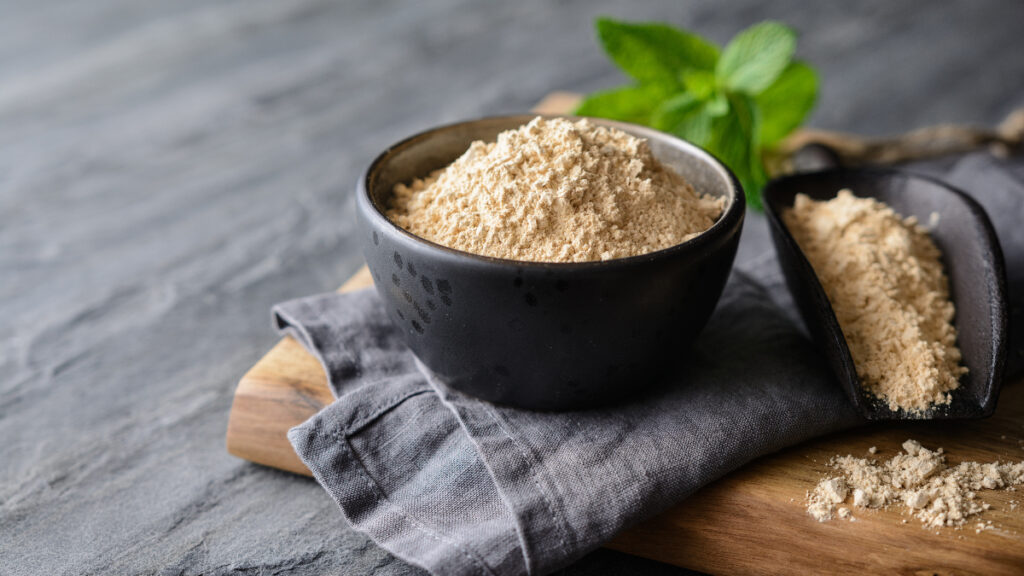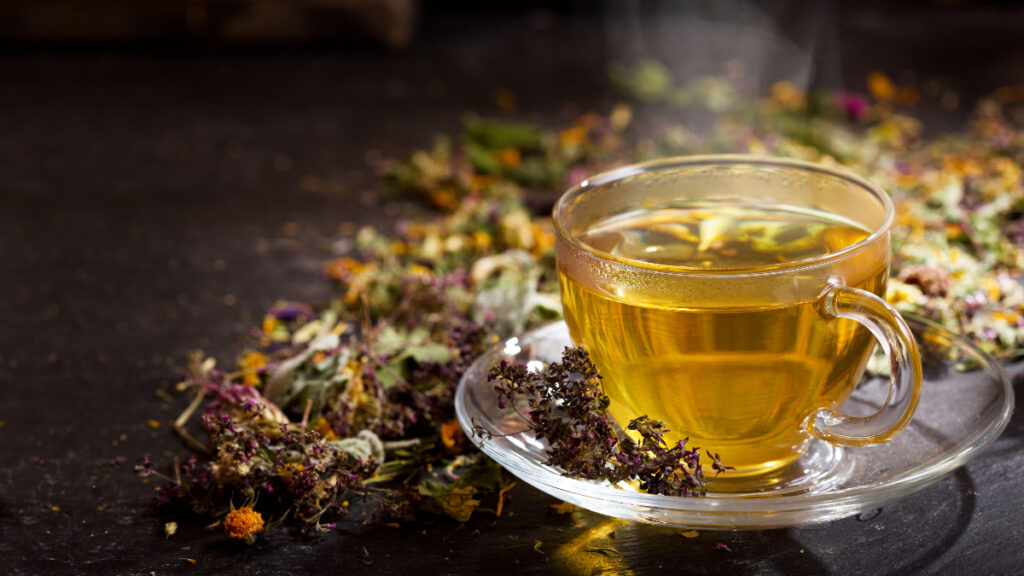Adaptogens are herbal products that can support stress and immunity. They’ve recently become more popular, with coffee shops and bars offering drinks containing them. However, are they just a novel marketing idea, or do they have real health benefits?
This article explains what adaptogens are and how they work. It gives an overview of stress and its effects on health and delves into the science to explore how adaptogens may help.
Additionally, it lists common adaptogens and some popular products suitable for vegans.
What are adaptogens?
Adaptogens are herbal and nutritional products that may help people adapt to and survive stress.
Moreover, people have used herbs with adaptogenic properties traditionally for centuries to treat wide-ranging conditions. These herbs are an integral part of traditional Chinese medicine, Ayurveda, and other alternative medical systems.
According to a 2021 review, adaptogens must be innocuous and cause minimal disorder to someone’s physiology. Additionally, they should also have non-specific actions, increasing resistance to many physical, chemical, and biological stressors.
Some combinations of adaptogenic plants have ‘synergistic’ interactions, working together in a beneficial way that may not be possible with one ingredient alone. The plants may also work on multiple body systems at the same time.
This approach is different from mainstream medicine, which tends to prescribe one medication for one disease.
How adaptogens help with stress
‘Homeostasis’ is a definition that describes when the body is in a healthy and stable state. Adaptogens help to maintain homeostasis and enable the body to cope with the demands of stress.
The active compounds in adaptogens regulate the body’s stress response by affecting the brain, hormones, and immune system. Together, these systems are called the neuroendocrine-immune system.
What is stress?

To understand how adaptogens help with stress, it is helpful first to explore what stress is.
A 2019 review defines stress as the ‘nonspecific response of the body to any demand for change.’
Several types of stress affect the body. These include metabolic stress that occurs in exercise, environmental stress from pollution or chemicals, and psychological stress.
67 percent of American adults experienced increased stress during the COVID-19 pandemic.
The American Psychological Association
Stress can be positive when it helps someone to focus or perform better. However, prolonged stress can have adverse health effects.
The American Psychological Association revealed in their 2020 report that 67 percent of American adults experienced increased stress during the COVID-19 pandemic. The report also indicated that other sources of stress in the US in 2020 included health care, political uncertainty, and discrimination.
In the 1950s, scientist Hans Selye coined the term stress as we currently use it today. Selye’s theory of general adaptation syndrome describes three stages of stress:
- Alarm reaction: the ‘fight or flight’ response to stress in which heart rate increases and the body releases the stress hormones cortisol and adrenaline.
- Resistance stage: the body either recovers from the stress and starts to normalize or continues to secrete stress hormones for a more extended time. In the resistance stage, someone may feel irritable, frustrated, or have poor concentration.
- Exhaustion stage: as a result of chronic prolonged stress, the body may become fatigued, anxious, or depressed. The immune system is weaker, and there is a higher risk of stress-related illness.
According to a 2021 review, adaptogens trigger a survival mechanisms called the ‘adaptive stress response.’ This action prevents inflammation, protects against neurodegeneration, and promotes healthy aging.
What are the effects of stress?
Stress can have wide-ranging effects on emotions, mood, and behavior. For example, prolonged stress can cause anxiety, depression, and insomnia. Additionally, stress is a factor in eating disorders, alcohol or drug abuse, and social withdrawal.
According to the American Institute of Stress, some physical effects of stress include:
- headaches, migraines, and musculoskeletal conditions
- inflammation in the cardiovascular system causing heart attacks with repeated acute stress
- digestive disturbances to the stomach and bowels
- impairments to the reproductive system and sex drive
- hyperventilation and panic attacks
- reduced immune function and susceptibility to infection
The wide-ranging effects of adaptogens can help to counteract some of these effects. For example, many adaptogens support the immune system, helping to reduce inflammation and susceptibility to infections that may arise due to stress. Other adaptogenic properties may include supporting digestive symptoms or helping to regulate energy.
List of adaptogens
Because adaptogens have non-specific actions, scientists have studied their effectiveness for several health conditions, including stress. The following explores some common adaptogens and looks at the research behind them.
Ashwagandha

Withania somnifera? , which people know more commonly as ashwagandha or Indian ginseng, is a popular adaptogen for stress.
According to Medline Plus, the Natural Medicines Comprehensive Database rates ashwagandha as possibly effective for stress but with insufficient evidence to rate effectiveness for other uses such as anxiety and insomnia.
Medline Plus also details many moderate interactions with ashwagandha and prescribed drugs, so people must check with their doctor before taking them.
Rhodiola rosea
Rhodiola rosea is a high-value medicinal plant that grows in mountainous regions throughout Europe, Asia, and North America.
A 2017 review indicates that Rhodiola rosea may be beneficial for stress, the prevention of cancer, and anti-aging. Moreover, the review reports that compounds in the herb may facilitate DNA repair, enhanced immunity, and anti-inflammatory effects.
An older 2010 review suggests that some studies have highlighted the herb’s beneficial effects for fatigue, insomnia, and depressive symptoms.
Ginseng
According to a 2018 review, people worldwide use ginseng to enhance the human body’s resistance, with beneficial effects including anti-anxiety, anti-depression, and anti-aging.
There are several different types of ginseng and ginseng-like herbs. Two of the most common are:
- Panax ginseng, which people also know as Asian or Korean ginseng
- Eleutherococcus senticosus, which people often know as Siberian ginseng
Studies suggest that ginseng has anti-cancer effects, protects against neurodegeneration, and helps to prevent diabetes. However, it’s important to note that much of the research is on animals and scientists need to validate these results in humans.
Maca

Maca (Lepidium meyenii) is a root vegetable that grows in the Andes Mountains.
According to Medline Plus, although people have taken maca as a traditional medicine for sexual and fertility issues, there isn’t enough quality evidence to support this.
However, a randomized, double-blind, placebo-controlled study in 2016 suggested improved mood, energy, and health status amongst 175 participants taking maca extract.
Other adaptogens
Other adaptogens include the following:
- Schisandra chinensis, which some studies indicate is effective for exhaustion, mental performance, and stress-induced depression.
- Tulsi (Ocimum sanctum) or Holy Basil which research suggests may counteract chemical, metabolic, and psychological stress.
- Licorice (Glycyrrhiza glabra) whose herbal properties include antibacterial, anti-inflammatory, and liver-protective.
- Medicinal mushrooms like Reishi, Maitake, Shiitake contain polysaccharides that act as adaptogens. Studies indicate they can modulate the immune system.
Adaptogen brands
There are numerous adaptogen products and brands that people can choose. However, someone should look for quality products from reputable companies and check the ingredients to make sure they are vegan.
People can consume adaptogens in the form of supplements, tinctures, and teas. In addition, some outlets sell drinks such as lattes and cold brews that contain adaptogenic herbs. People can also buy dried herbs, including different parts of the plant, such as the berries, leaves, or flowers.
Herbal product regulation and legislation vary from country to country. People can research this and find out how their government regulates herbal remedies and ensures their safety and quality.
The following are two reputable brands that offer adaptogen products. However, the author has not tried any of the products and has based information on research.
Gaia Herbs

Gaia Herbs farm is an organic farm located in the Blue Ridge Mountains of Western North Carolina. Each year they produce over 5 million plants representing 45 species of herbs.
According to their website, Gaia Herbs offers the world’s first herb traceability platform, allowing customers to trace their products and ensure quality and purity. In addition, all products are free from pesticides, microbes, and heavy metals.
All Gaia’s herbal products are vegetarian, and most are vegan. Some products contain honey or other bee-derived ingredients. Their liquid phyto-caps are made with plant-based ingredients.
Some vegan adaptogen products that Gaia Herbs sell include:
- Ashwagandha Root
- Rhodiola Rosea
- Adrenal Health® Daily Support
- Stress Response®
- Holy Basil Leaf
- Kava Root, Extra Strength
- Adaptogen Performance Mushrooms & Herbs
People can order from the Gaia Herbs website here.
Pukka Herbs

Pukka Herbs sell various herbal teas, remedies, and supplements in stores around the world and online. However, for online orders, they only ship to the mainland UK.
In 2017 Unilever acquired Pukka Herbs, which according to their co-founder Sebastian Pole allowed the company new levels of reach and opportunity.
Pukka Herbs continues to be a carbon-neutral, fair trade, and organic company.
Some products contain milk or honey and are not suitable for vegans. Options for adaptogens that are suitable for vegans include the following:
- Wholistic Ashwagandha
- Tulsi Clarity Tea
- Cacao Maca Magic Latte
- Ginseng Matcha Green Tea
- Mushroom Gold
Many of Pukka’s teas contain licorice root which is a natural adaptogen.
People in the UK can order from their website here.
Safety of adaptogens
Herbal products including adaptogens can have adverse effects and interact with medication that doctors prescribe.
For example, a 2020 review highlights that licorice (Glycyrrhiza glabra) can raise someone’s blood pressure and may cause toxic effects in people with heart or kidney conditions. Therefore, doctors contraindicate licorice for several health conditions and medications.
Another review indicates that inconsistent regulation of herbal products can lead to toxic effects and severe liver injury.
It’s critical that someone who has a health condition or is taking medications checks with their doctor before taking adaptogens. Equally, women who are pregnant or breastfeeding should avoid taking herbal medicines without their doctor’s approval.
Takeaway
In today’s environment of heightened stress and anxiety, adaptogens may provide a natural alternative to support someone’s symptoms. Adaptogens work on multiple body systems, aiming to ease them back into balance.
Limited research indicates that common adaptogens such as ashwagandha and Rhodiola may be possibly effective for stress, but scientists need to study adaptogens more extensively.
Adaptogens are potent herbs. And, someone who has a health condition or is taking medication should check with a healthcare professional before consuming them.






